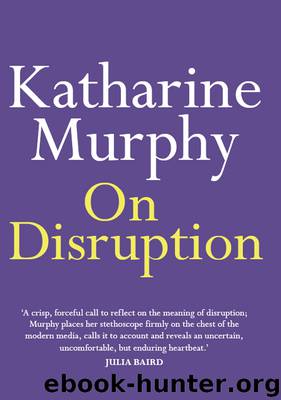On Disruption by Katharine Murphy

Author:Katharine Murphy [Murphy, Katharine]
Language: eng
Format: epub
ISBN: 9780522873801
Publisher: Melbourne University Publishing
Wondering, abstractly, about how all this might end is actually jumping way ahead of ourselves. Right now, media companies are preoccupied with survival, and our collective pathway to survival resides in the loyalty of our audiences.
Every morning at Guardian Australia, where I am currently political editor, our news conference opens with a question: how are the readers? The first item of business each day is a report on the readership over the past 24 hours. In addition to a readout on the traffic stats, the engagement editor also provides an update about attention times, which is a measure of the span of time readers spend with any particular piece.
Reporters are given these readership breakdowns in a daily email circulated to staff in what I suspect is now standard industry practice. Similar traffic reports were also circulated to reporters when I worked at Fairfax.
I’m one of those people fascinated by analytics. When I was a live blogger, I routinely logged on to our in-house analytics tool to watch the readership stats in real time, and to observe how the blog was being shared on social media sites.
This behaviour might seem odd, or distracting, but I was curious to know what was happening. My curiosity is also risk free in this sense: I’m lucky to serve a benign employer who conceptualises analytics as a pathway to producing quality work. The house preoccupation is not clickbait, or virality, but how to maximise eyeballs for work we regard as important.
But even if you are, like me, fortunate enough to work for a quality-focused media organisation, and face zero pressure from editors to write for the clicks, this data, once it begins to settle on you, can still be a form of psychological tyranny.
It can change your mindset. It can create a new form of performative pressure that mimics the ‘please like me’ relentlessness of social media culture. Like social media, where likes are the crude metrics of personal acceptance and affirmation that can form little grappling hooks in your brain, readership analytics can be addictive.
While I’m old enough and stubborn enough not to define or value myself by my metrics, I know I want to be read, particularly when I’ve put a lot of thought into a column, or pursued a new idea, or broken a story.
When I’ve worked hard on a contribution and it’s not that widely read, I interrogate myself as a direct consequence of the trove of knowledge I now have direct access to. How did that not work? How could I have made that more accessible? Why did scores of people read my incremental news story and only a handful that piece I spent days working up?
These were questions we print types never asked ourselves before the invention of readership analytics, because we didn’t have any relevant reference points to prompt the self-assessment.
A newspaper was the sum of collective effort, not a cult of individual performance. It wouldn’t have occurred to me to ponder whether anyone bought the paper because
Download
This site does not store any files on its server. We only index and link to content provided by other sites. Please contact the content providers to delete copyright contents if any and email us, we'll remove relevant links or contents immediately.
The Rules Do Not Apply by Ariel Levy(4946)
Bluets by Maggie Nelson(4539)
Too Much and Not the Mood by Durga Chew-Bose(4324)
Pre-Suasion: A Revolutionary Way to Influence and Persuade by Robert Cialdini(4200)
The Motorcycle Diaries by Ernesto Che Guevara(4078)
Walking by Henry David Thoreau(3943)
Schaum's Quick Guide to Writing Great Short Stories by Margaret Lucke(3368)
What If This Were Enough? by Heather Havrilesky(3299)
The Daily Stoic by Holiday Ryan & Hanselman Stephen(3288)
The Day I Stopped Drinking Milk by Sudha Murty(3183)
The Social Psychology of Inequality by Unknown(3011)
Why I Write by George Orwell(2940)
Letters From a Stoic by Seneca(2780)
A Short History of Nearly Everything by Bryson Bill(2679)
A Burst of Light by Audre Lorde(2586)
Insomniac City by Bill Hayes(2535)
Feel Free by Zadie Smith(2469)
Upstream by Mary Oliver(2382)
Miami by Joan Didion(2362)
